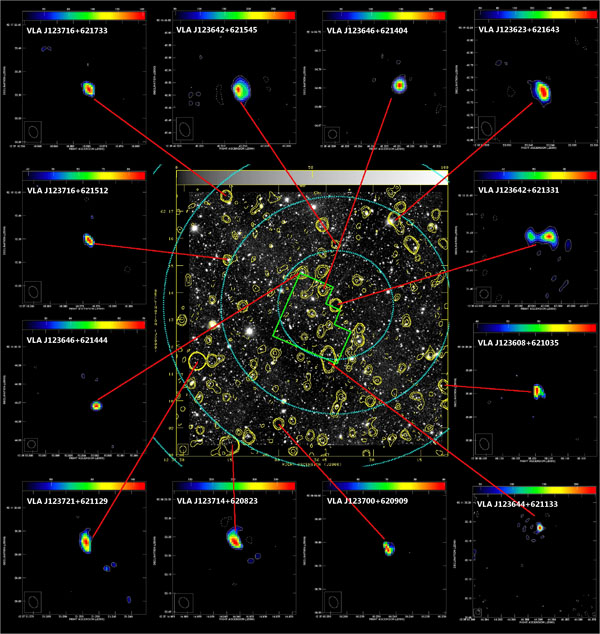Black holes – nowhere left to hide!
Very sensitive, wide-field observations with a worldwide network of radio telescopes have uncovered black holes in the centre of dust-obscured galaxies. In some cases, the amount of dust is so large that even x-rays from the accreting black holes are absorbed in these systems. The research conducted by astronomers Chi, Barthel and Garrett of Groningen and Dwingeloo, is due to appear in an upcoming issue of Astronomy & Astrophysics.
Even apparently normal galaxies seem to have black holes that are growing steadily by absorbing matter. The bright, exotic radiation that is usually the result of these ‘accretion’ processes seems to be completely obscured in some galaxies. The conclusion of the Dutch astronomers is that only a network of highly sensitive radio telescopes can detect these processes. The suspicion that the faint radio waves emitted by many galaxies in the distant early universe are the result of accretion by their black holes has now been proven.
Traditional radio telescopes, such as the Westerbork Synthesis Radio Telescope (WSRT), cannot determine the exact nature of the radio emissions. The Very Long Baseline Interferometry (VLBI) technique is needed, where a network of radio telescopes in different countries or continents observe the same object. The many gigabytes of data from the individual telescopes are then combined. This method digitally simulates a radio telescope thousands of kilometres in diameter, and as a consequence a very high resolution and sensitivity.
Using a VLBI-network of sixteen radio telescopes on two continents (Europe and the United States), a previously unimaginable recording sensitivity and resolution could be achieved, proving the accretion activity of the distant galaxies.
‘We know many galaxies have black holes. Of course, these need to have grown to what they are now, and it seems that thanks to these VLBI observations of the galaxies in the Northern Hubble Deep Field we can now really observe this growth’, say Prof. Peter Barthel of the Kapteyn Institute of the University of Groningen and Prof. Michael Garrett of ASTRON, the Netherlands Institute for Radio Astronomy in Dwingeloo.
Barthel adds: ‘We are proud of these results, but what is uppermost in our minds is the fact that the man who played the largest part in this research is no longer with us.’ PhD student Seungyoup Chi, from South Korea, died of a serious illness in the year he was due to be awarded a PhD by the University of Groningen. ‘This publication appears posthumously, in his memory’, say Barthel and Garrett, Chi’s supervisors.
More information
Contact:
Prof. Peter Barthel, Kapteyn Institute, University of Groningen
Prof. Michael A. Garrett
General Director & Scientific Director ASTRON Netherlands Institute for Radio Astronomy
Tel: +31 521 595126/+31 521595119, E-mail:
garrett astron.nl
Article: The publication ‘Deep, wide-field, global VLBI observations of the Hubble Deep Field-North and the Hubble Flanking Fields’ by S. Chi, P.D. Barthel and M.A. Garrett, Astronomy & Astrophysics.
DOI: http://dx.doi.org/10.1051/0004-6361/201220783

More news
-
15 September 2025
Successful visit to the UG by Rector of Institut Teknologi Bandung
